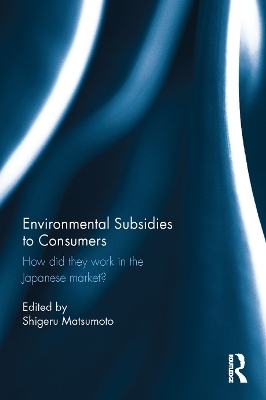
Environmental Subsidies to Consumers
Routledge (Verlag)
978-0-415-73107-2 (ISBN)
The book's empirical findings will be of interest to those who are researching on and policymakers of environmental and industrial policies.
Shigeru Matsumoto is Professor at the Department of Economics, Aoyama Gakuin University. He studied on Heiwa Nakajima Foundation Scholarship at North Carolina State University, where he earned his PhD in Economics. His research interest lies in the applied welfare economics, with particular focus on consumer behavior analysis.
Part I: Environmental Subsidies to Consumers: Conceptual issues 1. Environmental Subsidies to Consumers: Introduction 2. Environmental Subsidies to Consumers as Policy Instruments 3. Environmental Tax and Subsidy in Japan: Past and present Part II: Rebate Program for Energy Efficient Appliances Japanese Electronic Appliance Market 4. Effect of an Eco-Point Program on Consumer Digital TV Selection 5. A Policy Evaluation of the Eco-Point Program: The program’s impact on CO2 reductions and the replacement of home appliances 6. Did the Purchase Subsidy for Energy-Efficient Appliances Ease Electricity Shortage after Fukushima? 7. Effect of the Eco-Point Program on Implicit Discount Rate: A hedonic analysis of eco-point program Part III: Rebate Program for Eco-friendly Vehicles Japanese Motor Vehicle Market 8. Cross- Country Policy Comparison: What are the elements of a successful eco-car policy? 9. CO2 Emission Reductions from Hybrid Vehicle Use: An analysis of Japan’s used car market data Part IV: Environmental Subsidies to Consumers Multiple Points 10. Subsidy for Eco-Friendly Houses: Can it be an ultimate solution? 11. Environmental Subsidies and Life Cycle Assessment Part V: Concluding Part 12. Lessons for Future Environmental and Industrial Policies: Concluding remarks
| Zusatzinfo | 62 Tables, black and white; 44 Line drawings, black and white; 44 Illustrations, black and white |
|---|---|
| Verlagsort | London |
| Sprache | englisch |
| Maße | 156 x 234 mm |
| Gewicht | 521 g |
| Themenwelt | Sozialwissenschaften ► Soziologie ► Spezielle Soziologien |
| Technik ► Elektrotechnik / Energietechnik | |
| Technik ► Umwelttechnik / Biotechnologie | |
| Wirtschaft ► Volkswirtschaftslehre ► Mikroökonomie | |
| ISBN-10 | 0-415-73107-0 / 0415731070 |
| ISBN-13 | 978-0-415-73107-2 / 9780415731072 |
| Zustand | Neuware |
| Haben Sie eine Frage zum Produkt? |
aus dem Bereich



